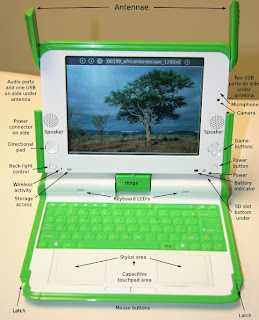The challenge was to create a laptop that would cost $100. In the end, the laptop cost $200. While twice as expensive as initially planned, it remains an affordable computer. The computer is the size of a "textbook and lighter than a lunch box." Here's what the computer looks like:

Click on the picture for a larger view. Image source: laptop.org/en/laptop/hardware/specs.shtml
As far as powering the computer - a question which came up in class, the website explains how it works:
"XO is fully compliant with the European Union's RoHS Directive. It contains no hazardous materials. Its NiMH batteries contain no toxic heavy metals, plus it features enhanced battery management for an extended recharge-cycle lifetime. It will also tolerate alternate power-charging sources, such as car batteries.
In addition, —for use at home and where power is not available—the XO can be hand powered. It will come with at least two of three options: a crank, a pedal, or a pull-cord. It is also possible that children could have a second battery for group charging at school while they are using their laptop in class."
Citation: laptop.org/en/laptop/hardware/features.shtml
Individuals worldwide may participate in the program in helping get a computer to every child. One may either volunteer in some capacity in the program or one may pay to place a computer.
Since this project may have great influence on the future of computing, I encourage folks to visit the OLPC site. The site dedicates pages to the vision, the computer, participation in the program, and the children who benefit from the project. I recommend exploring the laptop pages. It has already revolutionized "the existing concept of computer interface." The project built an interface specifically for children and their targeted activity of learning. The project created "a “zoom” interface that graphically captures fellow learners and teachers as collaborators, emphasizing the connections within the community, among people, and their activities."
Citation: laptop.org/en/laptop/interface/
The cost effective production and the radically new interface may set a new benchmark for future computing worldwide.
No comments:
Post a Comment